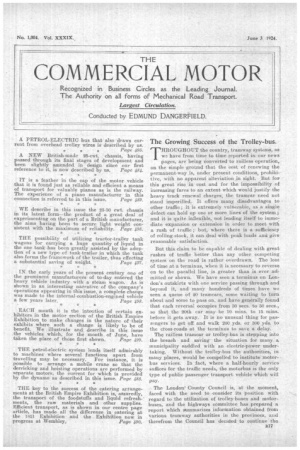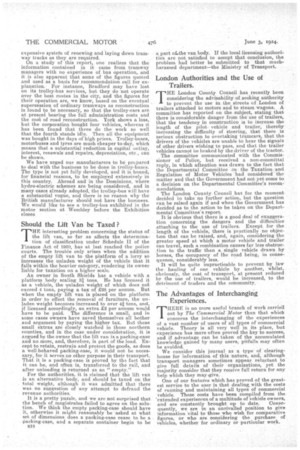The. Growing. Success of the Trolley-bus.
Page 1

Page 2

If you've noticed an error in this article please click here to report it so we can fix it.
THROUGHOUT the country, tramway systems, as we have from time to time reported in our news . Pages, are being converted to railless operation, on the simple ground that the cost of renewing the permanent-way is, under present conditions, prohibi-Live, with no apparent alleviation in sight. But for this great rise in cost and for the impossibility of increasing fares to an extent which would justify the heavy track renewal charges, the tramcar need not stand imperilled. It offers many disadvantages to other traffic; it is extremely vulnerable, as a single defect can hold up one or more lines of the .systeme and it is quite inflexible, not lending itself to irtane.diate expansion or extension in order to meet with a rush of traffic; but, where there is a sufficiency of rolling-stock, it can deal with peak loads and give reasonable satisfaction. .
But this claim to be capable of dealing with great rushes of traffic better than any other competing system on the road is rather overdrawn. The lose of time at a terminus, when it is. necessary to reverse on to the parallel line, is greater than is ever ads mitted or shown. We have seen a terminus on Lon,. don's outskirts with one service passing through and beyond it, and mans' hundreds of times have we seen a queue of 20 tramcars, some waiting to 'turn about and some to pass on, and have generally found that eaeh reversal occupies from 30 secs. to 50 secs.,' so that the 20th car may be 10 mins. to 15 mins. before it gets away. It is no unusual thing for passengers to get off and walk 200 yds. or 300 yds. to the cross-roads at the terminus to save a delay.
The railless tramcar or trolley-bus is stepping into the breach and saving the situation for many a municipality saddled with an electric-power undertaking.. Without the trolley-bus the authorities, in many places, would be compelled to institute motorbus services. In fact, where a half-hourly service sufficee for the traffic needs, the motorbus is theonly type of public passenger transport vehicle which will pay.
The London' County Council is, 'at the moment, faced with the need to consider its position with regard to the utilization of trolley-buses and motorbuses, and the highways cOmmittee has prepared a report which nirtimarises information obtained from various tra-mway authorities in the provinces, and therefrom the Council has decided to continue the expensive systetn of renewing and laying down tramway tracks as they are required. On a study of this report, one realizes that the information contained in it came from tramway managers with no experience of bus operation, and it is also apparent that some of the figures quoted and used as a basis for recommendation call for explanation. For instance, Bradford may have lost on its trolley-bus services, but they do not operate over the best routes in the city, and the figures for their operation are, we know, based on the eventual supersbssion of ordinary tramways as reconstruction is found to be necessary, so that the trolley-cars are at present bearing the full administration costs and the cost of road reconstruction. York shows a loss, but the corporation bought four vehicles, whereas it has been found that three do the work so well that the fourth stands idle. Then all the equipment was bought in the days of high prices. Trolley-buses, motorbuses and tyres are much cheaper to-day, which means that a substantial reduction in capital outlay, interest, renewals and repairs, depreciation, etc , can be shown.
We have urged our manufactarers to be prepared to deal with the business to be done in trolley-buses. The type is not yet fully developed, and it is bound, for financial reasons, to be employed extensively in this country. Abroad and in the Dominions, where hydro-electric schemes are being considered, and in many cases already adopted, the trolley-bus will have a substantial vogue, and there is no reason why the British manufacturer should not have the business. We would like to see a trolley-bus exhibited in the motor section at Wembley before the Exhibition closes
Should the Lift Van be Taxed ?
THE interesting problem concerning the status of the lift van, so far as affects the determination of classification under Schedule II of the Finance Act of 1920, has at last reached the police courts. The trouble only arises when the addition of the empty lift van to the platform of a lorry so increases the unladen weight of the vehicle that it falls within the heavier category, rendering its owner liable for taxation on a higher scale.
An owner in South Shields has a vehicle with a platform body scaling 3.1 tons. He has licensed it as a vehicle, the unladen weight of which does not exceed 4 tons, paying a tax of 228 per annum. But when the empty lift van is placed on the platform in order to effect the removal of furniture, the unladen weight becomes increased to over 41 tons, and, if licensed accordingly, an extra £2 per annum would have to be paid. The difference is small, and in some cases owners have saved themselves all bother arid argument by paying the higher tax. But these small extras are closely watched in those northern counties, and in the case under consideration, it is argued by the owner that the lift van is a packing-case and no more, and, therefore, is part of the load. Except to retain, restrain and protect the goods, as does a weRbehaved packing-case, it would not be necessary, for it serves no other purpose in their transport. That it is a packing-case is proved by the fact that it can be, and often is, transferred to the rail, and after unloading is returned as an " empty."
For the authorities, it is claimed that the lift van is an alternative body, and should be taxed on the total weight, although it was admitted that there was no suggestion of any attempt to defraud the revenue authorities.
It is a pretty puzzle, and we are not surprised that the bench of magistrates failed to agree on the solution. We think the empty packing-ease should have it, otherwise it might reasonably be asked at what set of dimensions does a packing-case cease to be a Packing-case, and a separate container begin to be B18
a, part olthe van body. If the local licensing authorities are not satisfied to accept that conclusion, the problem had better be submitted to that muchharassed department—the Ministry of Transport.
London Authorities and the Use of Trailers.
HE London County Council has recently been considering the advisability of seeking authority to prevent the use in the streets c-f London of trailers attached to motors and to steam wagons. A committee has reported on the subject, stating that there is considerable danger from the use of trailers, that the tendency in construction is to increase the length of the pilot vehicle and trailer, thereby increasing the difficulty of steering, that there is serious obstruction to overtaking tramcars, that the drivers of the vehicles are unable to hear the signals of other drivers wishing to pass, and that the trailer vehicles cannot be braked by the driver of the tractor.
The committee communicated with the Commissioner of Police, but received a non-committal reply, in which aftention was drawn to the fact that the Departmental Committee the Taxation and Regulation of Motor Vehicles had considered the matter and that the Government had not yet come to a decision on the Departmental Committee's recommendations.
The London County Council has for the moment decided to take no further action, but the question can be raised again if and when the Government has decided as to the action to be taken on the Departmental Committee's report. It is obvious that there is a good deal of exaggeration concerning the dangers and the difficulties attaching to the use of trailers. Except for the length of the vehicle, there is practically no objection that can be raised, and, again, considering the greater speed at which a motor vehicle and trailer can travel, such a combination causes far less obstruction to the traffic than a single vehicle drawn by horses, the occupancy of the road being, in consequence, considerably less.
It will be quite impracticable to prevent by law the hauling of one vehicle by another, whilst, obviously, the cost of transport, at present reduced by the use of trailers, would be increased, to the detriment of traders and the community.
The Advantages of Interchanging Experiences.
THERE is no more useful branch of work carried out by The Commercial Motor than that which concerns the interchanging of the experiences of a vast number of users of all types of commercial vehicle. Theory is all very well in its place, but experience has more often proved the key to success, and if advantage can be taken of the accumulated knowledge gained by many users, pitfalls may often be avoided.
We consider this journal as a type of clearinghouse for information of this nature, and, although transport managers sometimes appear reluctant to give full details of their organizations, yet the majority consider that they receive full return for any help which they may .give.
One of our features which has proved of the greatest service to the user is that dealing, with the costs of running and maintaining all types of commercial vehicle. These costs have been compiled from the 'extended experiences of a multitude of vehicle owners, and are constantly brought up to date. Consequently, we are in an unrivalled position to give information vital to those who wish for comparative figures, or who are considering the purchase of vehicles, whether for ordinary or particular work.






























